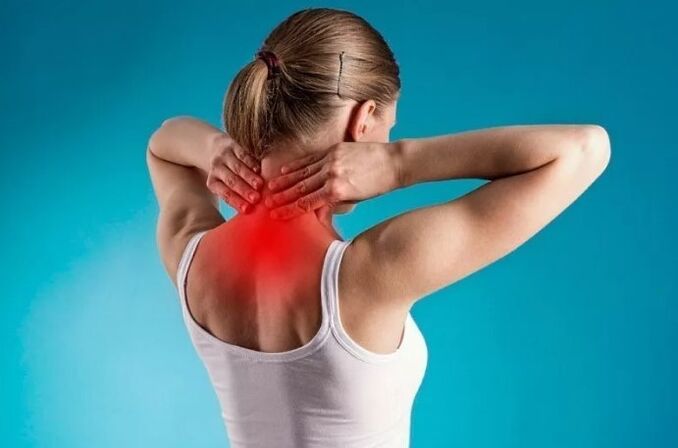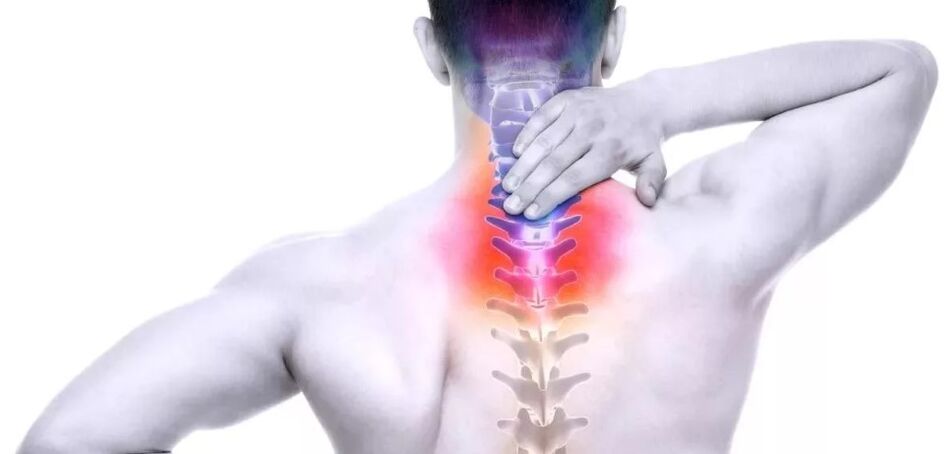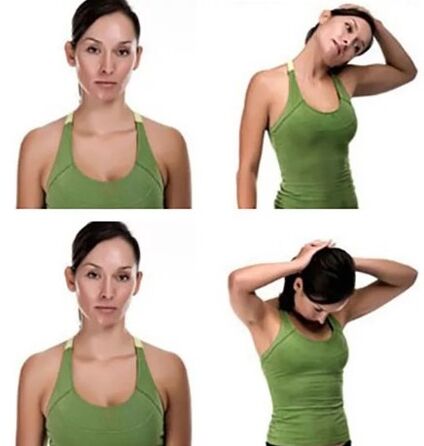The cervical osteochondrosis is the progressive dystrophic and triggering lesion of the intervertebral discs in the range of 1-7 vertebrae, which are part of the cervix region.
As a result of cervical osteochondrosis, deformation, exhaustion and then damage to the vertebral bodies occurs. This disturbs normal blood supply and the nervous conductivity in the neck and in the areas that are innovated by the roots of the nerves of the cervical nerve.
A cervical osteochondrosis can be combined either isolated or combined with osteochondrosis of other departments - lumbar and sacral.
Reasons

The causes of dystrophic and degenerative changes in the intervertebral discs have not yet been adequately examined. The assumption that osteochondrosis is a senile phenomenon of confirmation. It is also found in children and young people.
A number of factors that are predisposed to the development of an osteochondrosis are differentiated. This includes:
- Sedomer and sitting lifestyle,
- Seating types of work with a static strain on the neck,
- overweight, inadequate physical development,
- dysplastic processes of connective tissue,
- Violation of blood circulation in the neck,
- Neck injuries,
- Scoliosis, attitude defects, unpleasant pillows and mattresses, mattresses,
- Hereditary disposition, metabolism defects.
Symptoms of a neck osteochondrosis
The cervical spine is particularly susceptible to the development of osteochondrosis-die vertebrae due to the characteristics of the skeleton, the uncomplicated and the size of the head are the smallest compared to other parts of the spine and the muscle frame is not very pronounced.
The most characteristic symptom about which patients complain - pain in the cervix region. Depending on the damage zone, the pain can be localized
- in the collar and in the shoulder;
- in the cervical spine;
- On the front surface of the chest.
Pain with cervical osteochondrosis can be attributed to the characteristics of the cervix region.
The first signs of cervical osteochondrosis are insignificant and slightly specific:
- The pain in the neck in the evening,
- Feeling of heaviness in the head, headache in the occipital zone,
- A feeling of deafness or tingling in the shoulders and hands,
- Crystal in the neck when turning the head and click on the vertebrae.

Leading symptoms:
Vegetative-dystonic
- Quite severe pain in the neck and especially in the area directly below the back of the head;
- Pain occurs in a position after a long stay (for example after sleep);
- The neck muscles are constantly tense;
- There are difficulties with the task of the hand aside;
- The fingers are restricted in movements on the affected side.
Since the vertebral arteries are compressed, neurological manifestations are observed: headache, nausea, fainting.
Spinal symptom
Pain is located behind the sternum on the left.
This type of pain should be distinguished from pain, such as easier with angina pectoris (with angina pectoris, nitroglycerin with osteochondrosis - NO).
With a gradual violation of the structure of the intervertebral discs, its compression (compression) and violations of the roots of the nerves as well as narrowing or violations of arteries and veins that take place in the area of the vertebral body.
This leads to the formation of special syndromes - radicular and ischemic.
- The defeat of the roots of the first cervical vertebra (C1): violations influence the back of the head and reduce the skin sensitivity;
- Lesion C2 gives pain in the crown of the crown and the back of the head;
- The lesion of C3 causes pain in the neck from the side of the violation, a decrease in sensitivity in the tongue and in the lower languages muscles, in some cases with language impairment and loss of control through language;
- The defeat of C4 and C5 causes pain in the shoulder and in the collarbone, a decrease in the tone of the muscles of the head and neck, the hiccup, breathing disorders and pain in the heart;
- The defeat C6 is most common and gives pain from the neck and shoulder blade, forearm, up to thumb, the skin sensitivity can suffer:
- The defeat C7 provides similar symptoms with pain in the neck, the shoulder, to the rear of the hand, violate the hand strength and a decrease in reflexes.
Due to the compression of the vessels in the area of the cervical vertebrae, migraines give headache, severe dizziness, visual impairment and ears in the ears, flicker flickers fly in front of the eyes, diseases of autonomous functions.

There can be manifestations of cardiac syndrome with pressure pain, lack of air and heartbeat as well as rhythm disorders.
Complications
Serious complications of cervical osteochondrosis are
- Ahead of intervertebral discs with the formation of a hernia (lead);
- Break of the intervertebral disc with violations of nerves and blood vessels is possible to compression the spinal cord, which can lead to death;
- There can also be radiculopathies (root lesions), the formation of osteophytes (spikes on the vertebrae) with a manifestation of paresis and paralysis.
Diagnosis
In the presence of the complaints mentioned above, an appeal to the orthopedic doctor or neurologist is required.
First, the doctor will evaluate mobility and pain in the neck that evaluate sensitivity and other functions. A radiography of the cervical spine is then required in several projections, if necessary, computer tomography or magnetic resonance firs with suspected hernia.
Rheoencephalography and investigation of the fund will be required for circulatory diseases.
Treatment of cervical osteochondrosis
Today there are both traditional and non -traditional methods for the treatment of osteochondrosis in the cervical spine.
Conservative methods are mainly used:
- Symptomatic therapy with analgesics to relieve pain syndrome
- Reception of anti -inflammatory drugs of non -steriaidal series to inflammation and edema of tissues
- In order to remove muscle cramps, anti -spas modos and medication are used to improve blood circulation.

When treating cervical osteochondrosis, substances are used that restore the structure of intervertebral discs - chondroprotectors.
The course of the vitamin therapy of group B is shown, the external products for therapy are applicable - gels and ointments, creams with anti -inflammatory and analgesic components. Shows stimulants for the regeneration of intervertebral discs.
Outdoor and general massage, acupuncture, physiotherapy, physiotherapy and gymnastics and gymnastics help with the treatment of osteochondrosis. The method of osteopathy has proven to be good - a mild effect on the "clamping" muscles and vertebral zones.
When treating the cervical osteochondrosis, wearing a special collar (Shantsa collar) is recommended.
Complications of cervical osteochondrosis with hernia that violate sensitivity and blood circulation can be treated immediately.
The duration of treatment depends on the neglect of the disease, since osteochondrosis is a progressive chronic disease. The treatment can be long and preventive courses for life are carried out.
Proper nutrition helps to relieve the condition for osteochondrosis.
Exercises for the treatment of cervical osteochondrosis:
- Self -uniform: In a position with a straight back, the shoulders have to lower as low as possible while the neck must be pulled up. It is necessary to follow at least 10 approaches at least three times a day.
- Self -massage: put your neck on with a towel, take it at the ends and take it alternately for you to spread the muscles of the neck. In this case, it must be ensured that the towel does not slide over the neck.
- The gymnastics for the cervix region for osteochondrosis: small bend of the neck and curves and tilting of the head are shown. At a time, 5-7 tendencies are made in every direction. This exercise is most useful to appear after self -massage of the cervical spine.
prevention
The basis for the health of the cervical spine is a strong and healthy back, physical activity, a comfortable bed with anatomical pillows and mattress, correct posture and correct nutrition.
It is worth avoiding neck injuries and lifting weight. It is necessary to combine a longer sitting with rest and warm -up.

























